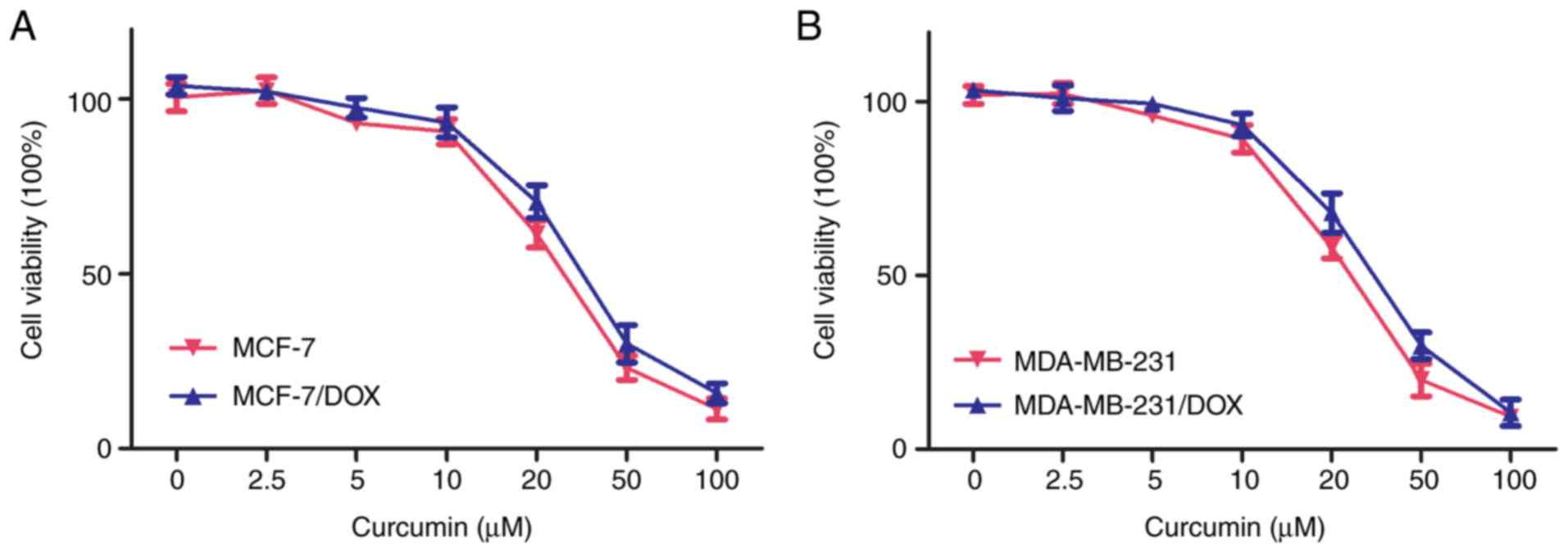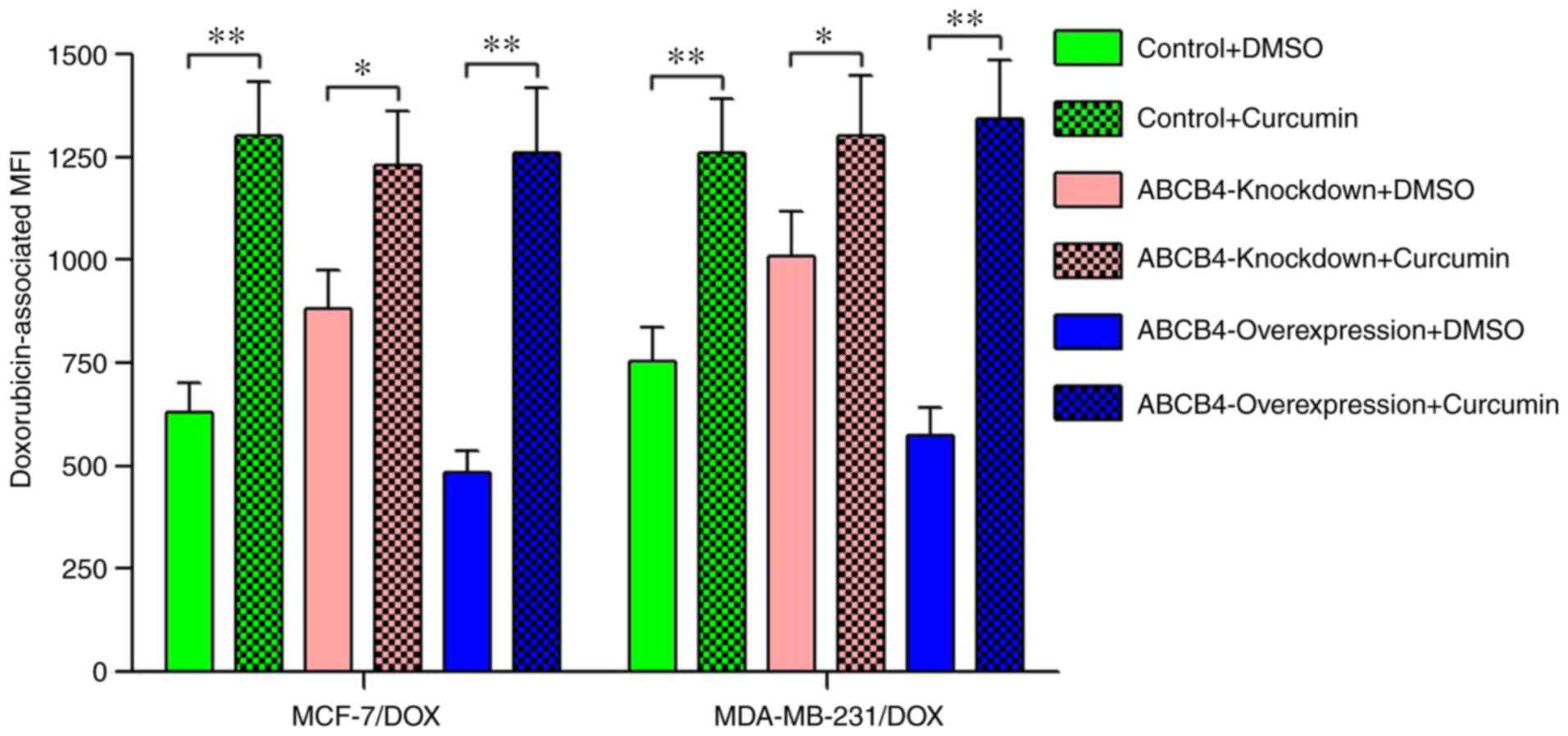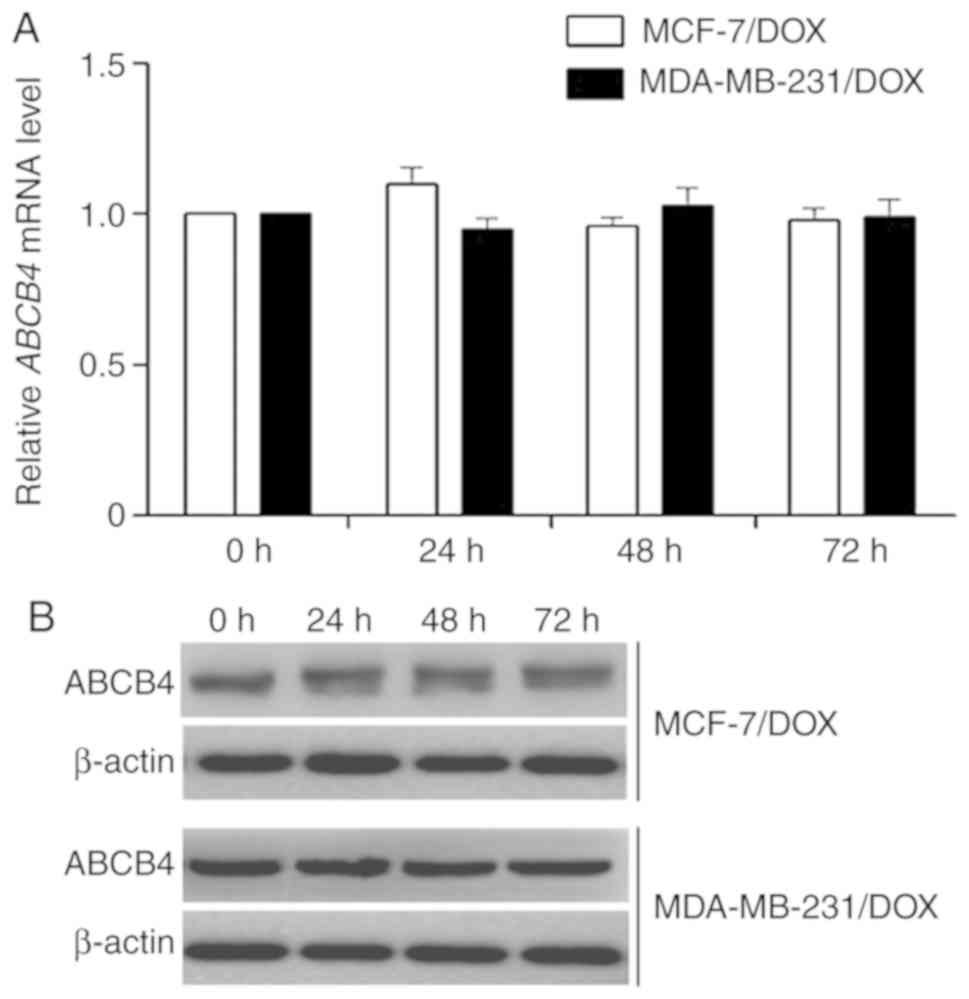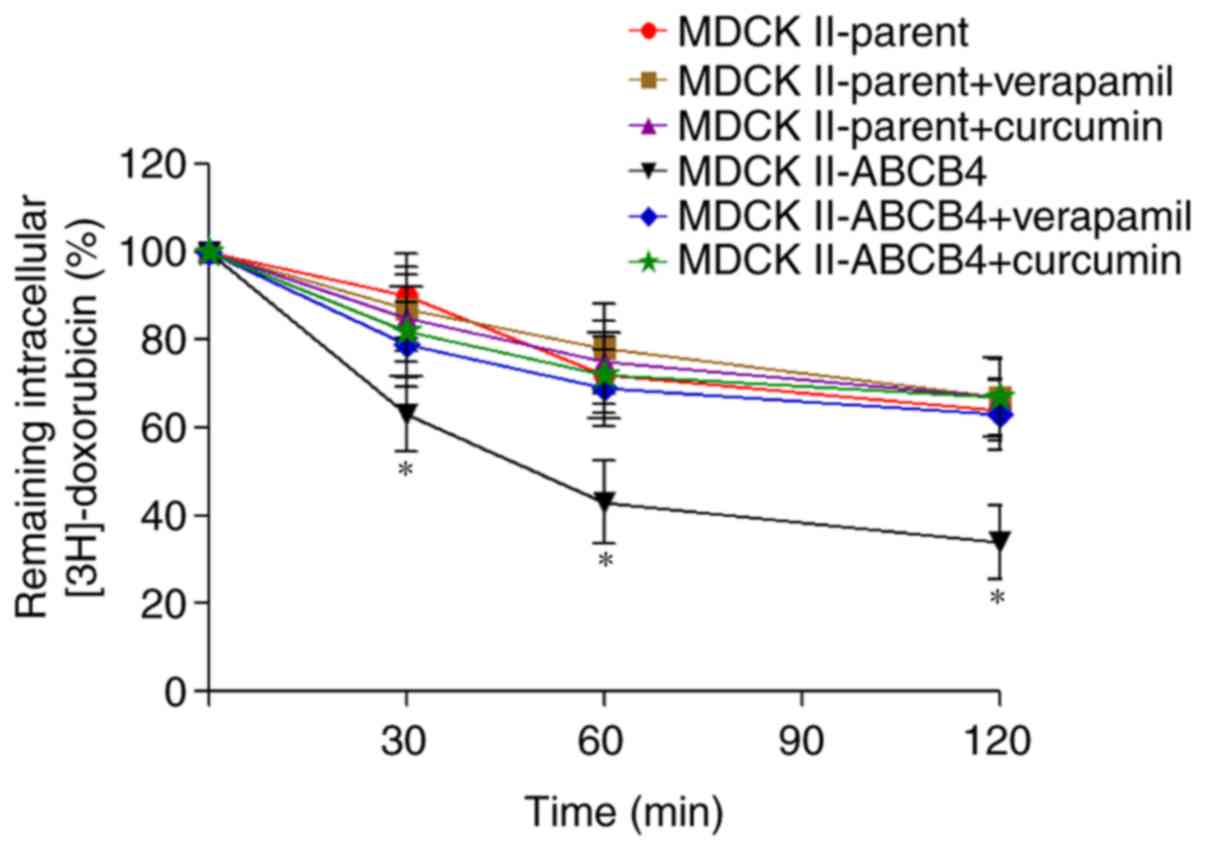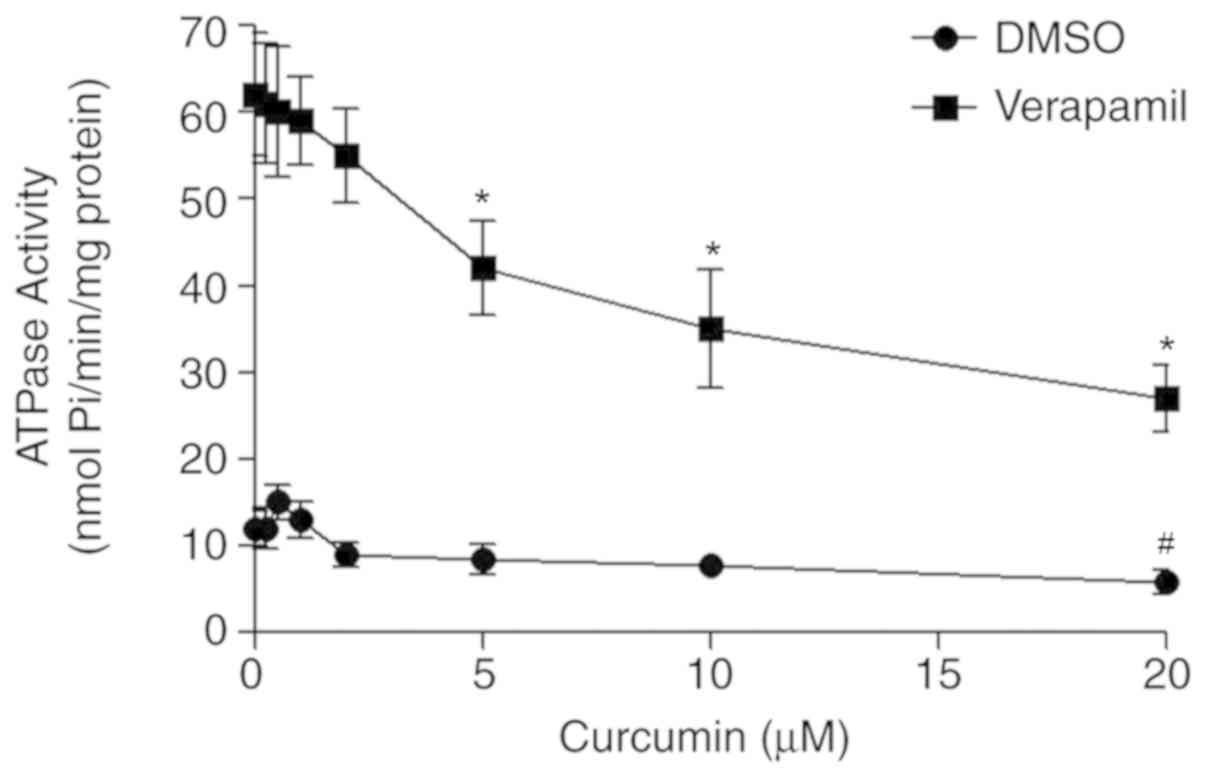|
1
|
Siegel RL, Miller KD and Jemal A: Cancer
statistics, 2018. CA Cancer J Clin. 68:7–30. 2018. View Article : Google Scholar : PubMed/NCBI
|
|
2
|
O'Shaughnessy JA: Pegylated liposomal
doxorubicin in the treatment of breast cancer. Clin Breast Cancer.
4:318–328. 2003. View Article : Google Scholar : PubMed/NCBI
|
|
3
|
Bonadonna G, Monfardini S, De Lena M and
Fossati-Bellani F: Clinical evaluation of adriamycin, a new
antitumour antibiotic. Br Med J. 3:503–506. 1969. View Article : Google Scholar : PubMed/NCBI
|
|
4
|
Prados J, Melguizo C, Ortiz R, Vélez C,
Alvarez PJ, Arias JL, Ruíz MA, Gallardo V and Aranega A:
Doxorubicin-loaded nanoparticles: New advances in breast cancer
therapy. Anticancer Agents Med Chem. 12:1058–1070. 2012. View Article : Google Scholar : PubMed/NCBI
|
|
5
|
Ween MP, Armstrong MA, Oehler MK and
Ricciardelli C: The role of ABC transporters in ovarian cancer
progression and chemoresistance. Crit Rev Oncol Hematol.
96:220–256. 2015. View Article : Google Scholar : PubMed/NCBI
|
|
6
|
Gottesman MM, Fojo T and Bates SE:
Multidrug resistance in cancer: Role of ATP-dependent transporters.
Nat Rev Cancer. 2:48–58. 2002. View
Article : Google Scholar : PubMed/NCBI
|
|
7
|
Ozben T: Mechanisms and strategies to
overcome multiple drug resistance in cancer. FEBS Lett.
580:2903–2909. 2006. View Article : Google Scholar : PubMed/NCBI
|
|
8
|
Van der Bliek AM, Baas F, Ten Houte de
Lange T, Kooiman PM, Van der Velde-Koerts T and Borst P: The human
mdr3 gene encodes a novel P-glycoprotein homologue and gives rise
to alternatively spliced mRNAs in liver. EMBO J. 6:3325–3331. 1987.
View Article : Google Scholar : PubMed/NCBI
|
|
9
|
Falguières T, Aït-Slimane T, Housset C and
Maurice M: ABCB4: Insights from pathobiology into therapy. Clin Res
Hepatol Gastroenterol. 38:557–563. 2014. View Article : Google Scholar : PubMed/NCBI
|
|
10
|
Němcová-Fürstová V, Kopperová D,
Balušíková K, Ehrlichová M, Brynychová V, Václavíková R, Daniel P,
Souček P and Kovář J: Characterization of acquired paclitaxel
resistance of breast cancer cells and involvement of ABC
transporters. Toxicol Appl Pharmacol. 310:215–228. 2016. View Article : Google Scholar : PubMed/NCBI
|
|
11
|
Januchowski R, Wojtowicz K, Andrzejewska M
and Zabel M: Expression of MDR1 and MDR3 gene products in
paclitaxel-, doxorubicin- and vincristine-resistant cell lines.
Biomed Pharmacother. 68:111–117. 2014. View Article : Google Scholar : PubMed/NCBI
|
|
12
|
Hontecillas-Prieto L, Garcia-Dominguez DJ,
Vaca DP, Garcia-Mejias R, Marcilla D, Ramirez-Villar GL, Saez C and
de Álava E: Multidrug resistance transporter profile reveals MDR3
as a marker for stratification of blastemal Wilms tumour patients.
Oncotarget. 8:11173–11186. 2017. View Article : Google Scholar : PubMed/NCBI
|
|
13
|
Huang JF, Wen CJ, Zhao GZ, Dai Y, Li Y, Wu
LX and Zhou HH: Overexpression of ABCB4 contributes to acquired
doxorubicin resistance in breast cancer cells in vitro. Cancer
Chemother Pharmacol. 82:199–210. 2018. View Article : Google Scholar : PubMed/NCBI
|
|
14
|
Ye MX, Zhao YL, Li Y, Miao Q, Li ZK, Ren
XL, Song LQ, Yin H and Zhang J: Curcumin reverses cis-platin
resistance and promotes human lung adenocarcinoma A549/DDP cell
apoptosis through HIF-1α and caspase-3 mechanisms. Phytomedicine.
19:779–787. 2012. View Article : Google Scholar : PubMed/NCBI
|
|
15
|
Yoshida K, Toden S, Ravindranathan P, Han
H and Goel A: Curcumin sensitizes pancreatic cancer cells to
gemcitabine by attenuating PRC2 subunit EZH2, and the lncRNA PVT1
expression. Carcinogenesis. 38:1036–1046. 2017. View Article : Google Scholar : PubMed/NCBI
|
|
16
|
Gupta SC, Kismali G and Aggarwal BB:
Curcumin, a component of turmeric: From farm to pharmacy.
Biofactors. 39:2–13. 2013. View Article : Google Scholar : PubMed/NCBI
|
|
17
|
Banik U, Parasuraman S, Adhikary AK and
Othman NH: Curcumin: The spicy modulator of breast carcinogenesis.
J Exp Clin Cancer Res. 36:982017. View Article : Google Scholar : PubMed/NCBI
|
|
18
|
Satoskar RR, Shah SJ and Shenoy SG:
Evaluation of anti-inflammatory property of curcumin (diferuloyl
methane) in patients with postoperative inflammation. Int J Clin
Pharmacol Ther Toxicol. 24:651–654. 1986.PubMed/NCBI
|
|
19
|
Mukhopadhyay A, Bueso-Ramos C, Chatterjee
D, Pantazis P and Aggarwal BB: Curcumin downregulates cell survival
mechanisms in human prostate cancer cell lines. Oncogene.
20:7597–7609. 2001. View Article : Google Scholar : PubMed/NCBI
|
|
20
|
Shao ZM, Shen ZZ, Liu CH, Sartippour MR,
Go VL, Heber D and Nguyen M: Curcumin exerts multiple suppressive
effects on human breast carcinoma cells. Int J Cancer. 98:234–240.
2002. View Article : Google Scholar : PubMed/NCBI
|
|
21
|
Shehzad A, Qureshi M, Anwar MN and Lee YS:
Multifunctional curcumin mediate multitherapeutic effects. J Food
Sci. 82:2006–2015. 2017. View Article : Google Scholar : PubMed/NCBI
|
|
22
|
Li H, Sureda A, Devkota HP, Pittalà V,
Barreca D, Silva AS, Tewari D, Xu S and Nabavi SM: Curcumin, the
golden spice in treating cardiovascular diseases. Biotechnol Adv.
Feb 1–2019.(Epub ahead of print). View Article : Google Scholar
|
|
23
|
Perkins K, Sahy W and Beckett RD: Efficacy
of curcuma for treatment of osteoarthritis. J Evid Based
Complementary Altern Med. 22:156–165. 2017. View Article : Google Scholar : PubMed/NCBI
|
|
24
|
Zhang DW, Fu M, Gao SH and Liu JL:
Curcumin and diabetes: A systematic review. Evid Based Complement
Alternat Med. 2013:6360532013. View Article : Google Scholar : PubMed/NCBI
|
|
25
|
Sinha D, Biswas J, Sung B, Aggarwal BB and
Bishayee A: Chemopreventive and chemotherapeutic potential of
curcumin in breast cancer. Curr Drug Targets. 13:1799–1819. 2012.
View Article : Google Scholar : PubMed/NCBI
|
|
26
|
Lv ZD, Liu XP, Zhao WJ, Dong Q, Li FN,
Wang HB and Kong B: Curcumin induces apoptosis in breast cancer
cells and inhibits tumor growth in vitro and in vivo. Int J Clin
Exp Pathol. 7:2818–2824. 2014.PubMed/NCBI
|
|
27
|
Lopes-Rodrigues V, Sousa E and Vasconcelos
MH: Curcumin as a modulator of p-glycoprotein in cancer: Challenges
and perspectives. Pharmaceuticals (Basel). 9(pii): E712016.
View Article : Google Scholar : PubMed/NCBI
|
|
28
|
Panda AK, Chakraborty D, Sarkar I, Khan T
and Sa G: New insights into therapeutic activity and anticancer
properties of curcumin. J Exp Pharmacol. 9:31–45. 2017. View Article : Google Scholar : PubMed/NCBI
|
|
29
|
Ge S, Yin T, Xu B, Gao S and Hu M:
Curcumin affects phase II disposition of resveratrol through
inhibiting efflux transporters MRP2 and BCRP. Pharm Res.
33:590–602. 2016. View Article : Google Scholar : PubMed/NCBI
|
|
30
|
Wortelboer HM, Usta M, van der Velde AE,
Boersma MG, Spenkelink B, van Zanden JJ, Rietjens IM, van Bladeren
PJ and Cnubben NH: Interplay between MRP inhibition and metabolism
of MRP inhibitors: The case of curcumin. Chem Res Toxicol.
16:1642–1651. 2003. View Article : Google Scholar : PubMed/NCBI
|
|
31
|
Prehm P: Curcumin analogue identified as
hyaluronan export inhibitor by virtual docking to the ABC
transporter MRP5. Food Chem Toxicol. 62:76–81. 2013. View Article : Google Scholar : PubMed/NCBI
|
|
32
|
Mukkavilli R, Jadhav G and Vangala S:
Evaluation of drug transport in MDCKII-Wild Type, MDCKII-MDR1,
MDCKII-BCRP and Caco-2 cell lines. Curr Pharm Biotechnol.
18:1151–1158. 2017. View Article : Google Scholar : PubMed/NCBI
|
|
33
|
Livak KJ and Schmittgen TD: Analysis of
relative gene expression data using real-time quantitative PCR and
the 2(-Delta Delta C(T)) method. Methods. 25:402–408. 2001.
View Article : Google Scholar : PubMed/NCBI
|
|
34
|
Chen Z, Shi T, Zhang L, Zhu P, Deng M,
Huang C, Hu T, Jiang L and Li J: Mammalian drug efflux transporters
of the ATP binding cassette (ABC) family in multidrug resistance: A
review of the past decade. Cancer Lett. 370:153–164. 2016.
View Article : Google Scholar : PubMed/NCBI
|
|
35
|
Li W, Zhang H, Assaraf YG, Zhao K, Xu X,
Xie J, Yang DH and Chen ZS: Overcoming ABC transporter-mediated
multidrug resistance: Molecular mechanisms and novel therapeutic
drug strategies. Drug Resist Updat. 27:14–29. 2016. View Article : Google Scholar : PubMed/NCBI
|
|
36
|
Kuttan R, Bhanumathy P, Nirmala K and
George MC: Potential anticancer activity of turmeric (Curcuma
longa). Cancer Lett. 29:197–202. 1985. View Article : Google Scholar : PubMed/NCBI
|
|
37
|
Doello K, Ortiz R, Alvarez PJ, Melguizo C,
Cabeza L and Prados J: Latest in vitro and in vivo assay, clinical
trials and patents in cancer treatment using curcumin: A literature
review. Nutr Cancer. 70:569–578. 2018. View Article : Google Scholar : PubMed/NCBI
|
|
38
|
Lv L, Qiu K, Yu X, Chen C, Qin F, Shi Y,
Ou J, Zhang T, Zhu H, Wu J, et al: Amphiphilic copolymeric micelles
for doxorubicin and curcumin Co-delivery to reverse multidrug
resistance in breast cancer. J Biomed Nanotechnol. 12:973–985.
2016. View Article : Google Scholar : PubMed/NCBI
|
|
39
|
Abouzeid AH, Patel NR, Rachman IM, Senn S
and Torchilin VP: Anti-cancer activity of anti-GLUT1
antibody-targeted polymeric micelles co-loaded with curcumin and
doxorubicin. J Drug Target. 21:994–1000. 2013. View Article : Google Scholar : PubMed/NCBI
|
|
40
|
Kim HJ, Im SA, Keam B, Ham HS, Lee KH, Kim
TY, Kim YJ, Oh DY, Kim JH, Han W, et al: ABCB1 polymorphism as
prognostic factor in breast cancer patients treated with docetaxel
and doxorubicin neoadjuvant chemotherapy. Cancer Sci. 106:86–93.
2015. View Article : Google Scholar : PubMed/NCBI
|
|
41
|
Ma W, Guo Q, Li Y, Wang X, Wang J and Tu
P: Co-assembly of doxorubicin and curcumin targeted micelles for
synergistic delivery and improving anti-tumor efficacy. Eur J Pharm
Biopharm. 112:209–223. 2017. View Article : Google Scholar : PubMed/NCBI
|
|
42
|
Link A, Balaguer F, Shen Y, Lozano JJ,
Leung HC, Boland CR and Goel A: Curcumin modulates DNA methylation
in colorectal cancer cells. PLoS One. 8:e577092013. View Article : Google Scholar : PubMed/NCBI
|
|
43
|
Huminiecki L, Horbańczuk J and Atanasov
AG: The functional genomic studies of curcumin. Semin Cancer Biol.
46:107–118. 2017. View Article : Google Scholar : PubMed/NCBI
|
|
44
|
Anand P, Kunnumakkara AB, Newman RA and
Aggarwal BB: Bioavailability of curcumin: Problems and promises.
Mol Pharm. 4:807–818. 2007. View Article : Google Scholar : PubMed/NCBI
|
|
45
|
Shome S, Talukdar AD, Choudhury MD,
Bhattacharya MK and Upadhyaya H: Curcumin as potential therapeutic
natural product: A nanobiotechnological perspective. J Pharm
Pharmacol. 68:1481–1500. 2016. View Article : Google Scholar : PubMed/NCBI
|
|
46
|
Ghalandarlaki N, Alizadeh AM and
Ashkani-Esfahani S: Nanotechnology-applied curcumin for different
diseases therapy. Biomed Res Int. 2014:3942642014. View Article : Google Scholar : PubMed/NCBI
|
|
47
|
Subramani PA, Panati K and Narala VR:
Curcumin nanotechnologies and its anticancer activity. Nutr Cancer.
69:381–393. 2017. View Article : Google Scholar : PubMed/NCBI
|
|
48
|
Zanotto-Filho A, Coradini K, Braganhol E,
Schröder R, de Oliveira CM, Simões-Pires A, Battastini AM, Pohlmann
AR, Guterres SS, Forcelini CM, et al: Curcumin-loaded lipid-core
nanocapsules as a strategy to improve pharmacological efficacy of
curcumin in glioma treatment. Eur J Pharm Biopharm. 83:156–167.
2013. View Article : Google Scholar : PubMed/NCBI
|















